Wine is abundant in our household; a day rarely goes by without some consumption of wine. When I read Erzsebet Gilbert's post: A winemaker wants to be a wine-baker, I thought what a good idea. There was a lot of discussion there whether or not alcohol kills off the yeasts. I thought the only way to find out is to try. Recently I have been making mainly Pain au Levain breads, so I took my formula and simply replaced 60% of hydration with wine. This number was a matter of convenience and also because I felt any less than 50% the wine flavor might not come through. As my starter is normally 75% hydration and my Pain au Levain is normally 68% hydration, when I substituted wine for the hydration for the final dough, the wine worked out to be roughly 60% of all hydration.
I did four doughs in the following order (my starter was the same for all four doughs):
(1) dough one with red wine previously boiled and cooled down to room temperature of about 20C / 68F;
(2) dough two with white wine previously boiled and cooled down to room temperature of about 20C / 68F;
(3) dough three with red wine as is from a bottle at room temperature; and
(4) dough four with white wine as is from a bottle in the refrigerator but warmed up to 20C / 68F.
The boiling was supposed to take off the alcohol in the wine (14.5% for my red, Australian Shiraz, and 14% for my white, Chardonnay).
[color=red][b][u]My formula for all four doughs are the same as follows:[/u][/b][/color]
- 300 g starter @ 75% hydration
- 285 g bread flour
- 15 g medium rye flour
- 192 g wine (for dough one and two above, I measured at least 220 g of wine to allow for evaporation from boiling)
- 9 g salt
Total dough weight (each) 800 grams and total dough hydration 68%
- In a large bowl, mix wine and flour only until just combined
- Autolyse 40 minutes
- Add salt and starter, and knead by hand for 3- 4 minutes (alternatively, stretch and fold in the bowl for 100 times to thoroughly mix all ingredients to a homogenous whole)
- Bulk fermentation 2 1/2 hours with two sets of stretch and folds, each set 20 - 30 times (dough temperature about 20 C/68 F, adjust fermentation time longer or shorter depending on room and dough temperatures)
- Pre-shape to a boule, rest 15 - 20 minutes, then shape to a tight boule
- Proof for 1/2 to 1 hour then place in the refrigerator for overnight retarding (I did 19 hours)
- Bake next morning with steam at 240C / 460F for 20 minutes and another 20 minutes at 210C / 410F
Below are the first and second Pains au Levain with wine (previously boiled to take off the alcohol):
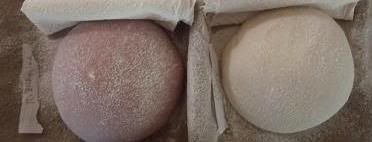
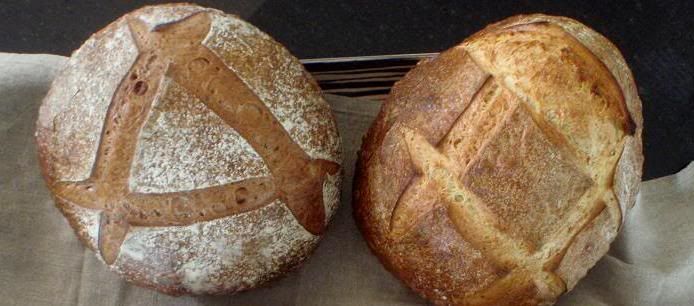
red loaf on the left and white loaf on the right
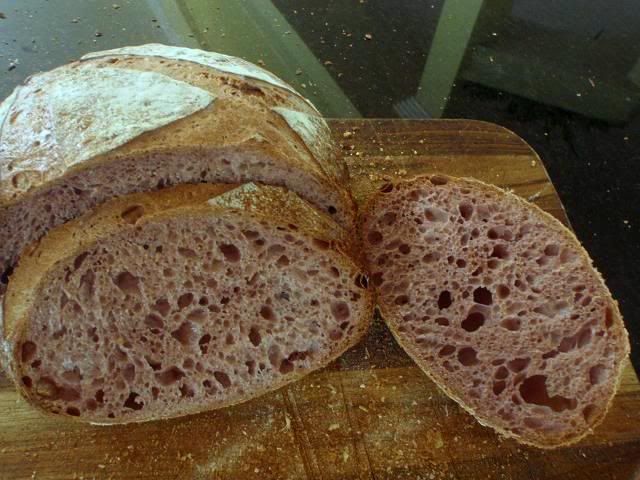
Pain au Levain with boiled red wine
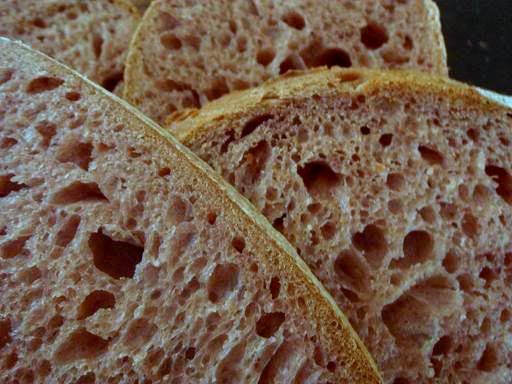
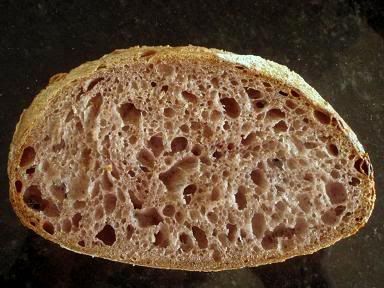
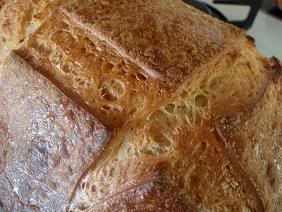
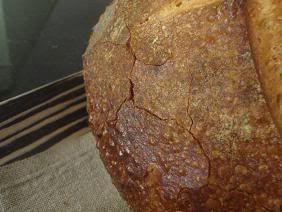
crust of Pain au Levain with boiled white wine
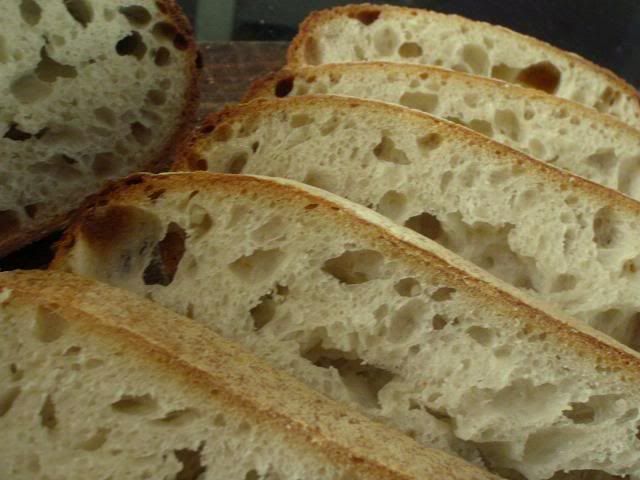
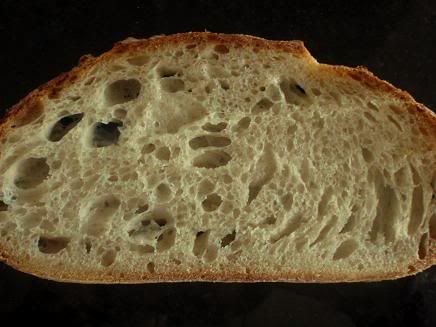
Both loaves have very open cell structure as above; the white one tastes to me no difference to a normal Pain au Levain, but the red one seems to taste more flavourful (I don't know if I am imagining flavors because of the color). Both crumbs are mildly chewy and not very sour, just like normal Pain au Levain. As the alcohol was taken off, the breads do not taste to me to have any trace of wine, save for the color in the red loaf. The breads are lovely just the same but I don't know if I can say for sure that the wine improves the bread in these two instances.
Following are breads made with wine straight from the bottle (dough three and four descriptions above). The doughs looked noticeably smaller after fermentation compared to the first two; however, it did not appear that the yeasts were completely killed off, there were some activity but far less compared to the first two loaves. The crumbs are very dense but extremely flavourful. When the breads were being sliced open, you could smell the strong alcoholic aroma from the wine. The white loaf has a hint of bitterness about it, but the red one has none of it (I don't know why but I can only guess that other flavor compounds which have come through the red wine have masked the bitterness).
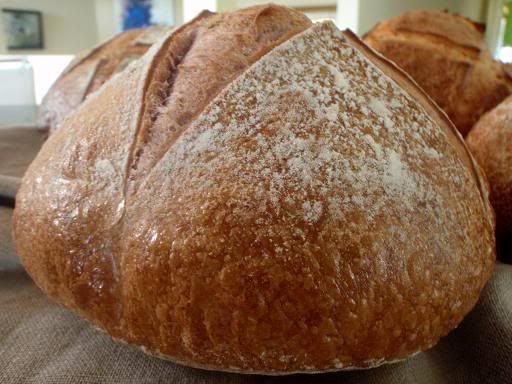
Pain au Levain with red wine (straight from bottle)
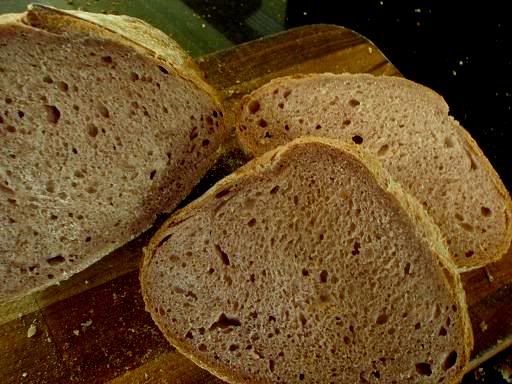
By the time I took this shot, the natural light was out so the color here is not exactly true.
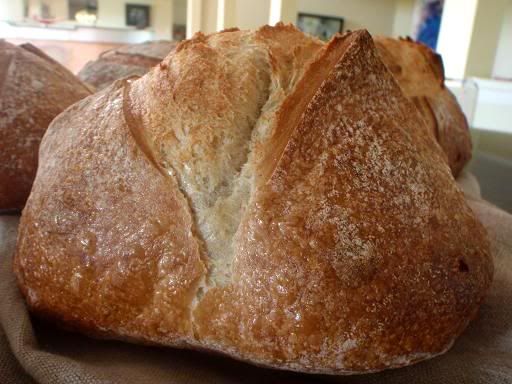
Pain au Levain with white wine (straight from bottle)
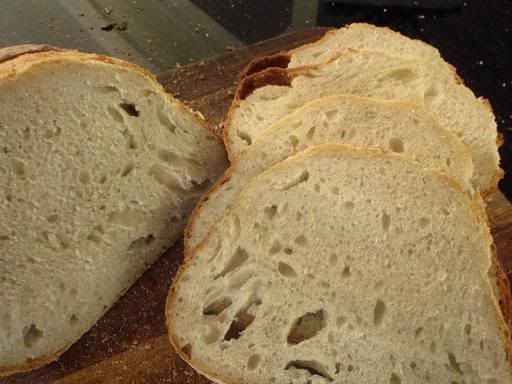
As someone says, flour is for baking, and wine is for drinking, and so perhaps it's best to keep the two separate?! Or, as Erzsebet says, they are delicious together too?!
I guess, it's your choice.
Shiao-Ping
- Shiao-Ping's Blog
- Log in or register to post comments
Love this post!
I have a question: You have recently mentioned that you now bake all of your loaves straight from the fridge, without letting them come to room temperature. What prompted you to do this? Are you getting more oven spring?
for easier scoring and better oven spring. The reason why it helps in getting oven spring is because I have a tendency of over-proofing my dough, and so when I put my dough into the refrigerator after bulk fermentataion, there is less of a chance of me over-proofing my dough. When the dough is slightly under-proofed, there is more of a chance of oven spring.
Geat post Shiao-Ping
You are a true workaholic , you must have been in the middle of this when you emailed the other night. i went to bed at 9.00 and i know Queensland is 3 hours ahead such dedication is inspiring. You have taken some big steps down the path with the comparisons. What did your taste testers think?
Regards Yozza
At the moment my daughter is the only taste tester and she loves them all. I had a slice of all four breads for brunch today (together with my Oolong tea, not a savory combination, one might think) and I loved them all. I underestimated the two dense breads yesterday. They are very flavourful, especially the red one, it has a very strong alcoholic aroma about it.
The two dense breads remind me of a northern Chinese dense rolls called Shang-Dong-Da-Bin (山東大餅) which is just flour and water (not sure if there is instant yeast but it is made with very low hydration). When I had it as a kid, I remember thinking to myself - Wow, it is full of flavors. I wondered at the time how that was possible because it really was just a plain roll. It is a staple for Northern Chinese Shang-Dong province where there is no rice production. When I was going to National Taiwan University, there was a very pretty girl in my dormitory from Korea whose parents were originally from Shang-Dong Province. Everyday I saw her eating these Shang-Dong-Da-Bins and a few times I saw her sick lying in bed. I asked her what happened; she said she had ulcers because she ate too much Shang-Dong-Da-Bins!! I guess too much of the same thing, however good, is a problem.
Regards, Shiao-Ping
Nifty! A couple comments!
First, if you want to nerd out a little you can get a hydrometer from any homebrew supply for a couple of bucks. This floats in your wine if it's sufficiently deep in the pot, or in a champagne glass if it's not. The level it floats at shows the density. As your alcohol steams away the density increases. Unless you are boiling for a good while, the alcohol is probably not going away!
Second, remember that it's not just the alcohol coming off in the steam, it's water too. Your wine is being reduced and concetrated. So you shouldn't be surprised if the flavor comes out stronger. If you want to nerd out a lot, you can look here. But that way lies madness, and a desperate flight from the revenoors in your big-block Dodge!
Third, I'm still wondering about preservatives in the wine inhibiting the yeasties.
Thanks for your great tips and welcome to the TFL!
Hydrometer sounds like a great idea. It's interesting that you said,
Well, I didn't boil for very long time at all; in fact, once it boiled, I took it off the stove. So, chances are there was still a lot of alcohol left?! Anyway, all I know is that the breads made with the wine previously boiled rose very well but the others didn't.
On a separate note, what you said gave me an idea that next time I could try using "wine reduction" as hydration for stronger wine flavors (much like in French cooking they reduce wine for sauces); but this will have to wait till we get cooler weather.
Many thanks for your suggestions.
I think the idea of making a reduction is terrific.
Rather than fold laundry, I just did a quick experiment - measured the gravity of a cup of wine and then just boiled it and measured again. I turned my head so I'm not sure how long it was on the boil, surely not more than a minute. But it was only a cup in a saucepan on high so it could go away pretty fast. The change in gravity was measurable, about half a percent higher. Which corresponds to the alcohol going from about 15% to about 12.5%. It's working but it's probably not working as much as you'd hoped. Also, its pH is somewhere between 3.5 and 4 (my pH strips aren't any more accurate than that). That's fine for wine but is it too sour for dough? I have a regular baby sponge started, I'll test that too in the morning.
Hi Darth Lefty
Thank you VERY MUCH for doing the experiment and letting us know the result. Your information about one minute boiling [color=red]reducing the alcohol from 15% to 12.5% [/color]is valuable for me. I definitely boiled my wine for less than one minute so it's very likely that the wine that I used had even higher alcohol content. And yet, it was sufficient to allow the starter to work properly! I don't know if I am missing anything here, but my two breads made with the boiled wine behaved very well. It made me think that perhaps the boiling also does something else to the wine because it is hard for me to believe that just a couple of percentages of alcohol off would make such a big difference in terms of the rising ability of the starter. You mentioned about preservatives possibly inhibiting yeast activity. I wonder if boiling "cleanse" off the preservatives.
One thing of note is that I first mixed only flour with wine, autolyse that, then combined it with salt and starter. In all four doughs, starter was the last to come in contact with the wine.
Is the pH 3.5 to 4 of Wine (after being boiled) too sour for dough? No, it doesn't appear so, at least for those that I made. I had a piece each of the four breads today and they didn't taste too sour at all.
I will be very interested to learn about your wine bread with sponge.
Thank you again.
You shouldn't rely on the 1 minute time corresponding to anything. It would probably be better to go by volume lost. But that's an experiment for another day.
I'm also still not sure why the boiled ones would do better than the non-boiled ones. But if it works, do it!
What I meant by "too sour" is too high acidity for the yeast to work at the rate you like, not too sour taste. But it seems all right by your experience.
I forgot to stick a pH strip in the baby this morning so I'll have to beg off til this evening.
Wow, Shiao-Ping! Your results are so gorgeous! I'm literally in awe. Oh, I have to try! A good loaf with a glass is always nice (or toast with a toast?), but the two merged are so beautiful! I would love to give you formula a try.
One thing, though: neither I nor my husband particularly like the sourdough flavor - only a matter of taste, really. I was wondering if the sourdough tang in this loaf is particularly strong, or alternately, if there are any ways to try this without the sourdough?
Oh my gosh, again, you are a genius!
I assume you meant you don't particularly like the sour sourdough taste; if that is the case, then you might want to give the French style sourdough, for instance, Pain au Levain, a try, or sourdough recipes which incoporate Poolish (100% hydration and some instant yeast) or even sourdough starter which is at 100% hydration; they normally "tone down" the sour sourdough taste.
Or, if you meant you simply don't like sourdough taste, full stop; then, perhaps you could look into converting the sourdough recipes into a yeasted bread recipes. In that case, I would suggest you do the starter as a preferment (or ferment) with a little instant yeast, much like the way Yozza did his wine bread in your wine-baking post[b] here[/b].
To me "the sourdough tang" is not very strong in all four loaves, but to you I am not sure if it is strong. Why not try Yozza's formula first, and see if you like it. What do you think?
I've got a loaf going now with about 76 grams wine in about total 600 grams of sourdough. It proofed pretty small so I put some instant yeast in it and rolled it up with some cream cheese. Wine and cheese, yes? Not brie cause it's what I had in the fridge. I'll let you all know how it turns out.
(I am working on a 65-67% hydration for your 600 gram sourdough. Is that correct?) You said the dough proofed pretty small, that was my experience too with my dough 3 and 4. At what point did you add instant yeast? By adding the instant yeast, you wouldn't know if your natural yeast would eventually work alright if given time. Yozza said in this comment to Erzsebet Gilbert's A winemaker wants to be a wine-baker post that:
Yozza was working on a 10 -15% wine as total hydration.
I'm still not sure about exact hydration in my sourdough because I'm still converting it to baker's percentages but it's about like so
250-ish grams baby sponge (about 1c, and 118% wet)
300-ish grams flour (about 2c)
76 grams wine (to stand in for 1/3c water).
7g salt
It's therefore pretty stiff stuff, around 50%.
I kneaded in the yeast after the beat-down. It was noticeably slower and smaller than the regular recipe. And yes, I want something I can bake in the morning to take to a bbq in the evening. With the huge sponge contribution I think the flavor will be fine. It always has been. I'm pretty sure that's why the recipe is set up that way.
The cream cheese was 31 grams of Kraft Philly "1/3 less fat" style, exactly 1 serving.
The pH of the sourdough baby sponge was in the 4.5-5 range. Much less sour than the wine. I wonder what would happen if I added calcium carbonate to the wine to bring it up.
The cheese soaked into the loaf. The bread was pretty dense with lots of tiny holes, the same as your "no boil" versions. It was pretty good. I'd do it again. Here's what I think I'll do next time round: Measure out 76g wine; reduce about a third; top up with water back to 76g. Also, head for a higher overall hydration. Measuring out by weight should take care of that.
I gave the wine bread a try, with interesting results (at least for me), with your recommendations regarding starters - I have to load the pictures and my experimental recipe, but more to come!
Would love to learn about your result. Thanks.
Shiao-Ping
My original comment about wine in bread was that i had made some and was quite happy with it but it did seem to be slowed down on that occasion it would have been a lot more than 10 to 15% it wasn't measured on that occesion, but must have been high because of the colour.
the recent bake inspired by Erzsobet was intended to be low percentage ended up being 16% WINE.with the chance of increasing with subsequent bakes.
Last night the duty chef for the training restaurant was keen to have a try so i stayed back and we did a dough for dinner rolls
2 kgs of flour, 1 bottle of cabsav /shiraz 750ml brought to the boil and then cooled 500ml water 40g salt, 40g butter, 500g walnuts toasted 40g instant yeast, 10g bread improver.
This was treated as an instant dough the colour was brilliant we used some rice flour on the top and cut deeply to have some contrast.
They looked really good and lovely soft crumband i havent seen anyone to ask how they were recieved by the diners yet. but very happy with the way the dough behaved. with what would have equated to 60% wine content .
i do have pics on another camera will post soon
Thank you for sharing with us. That is a very interesting combination. If your red wine was boiled, you may find that the quantity would have been at least 5 - 10% less due to evaporation.
Did the 2% instant yeast compensate for the fact that the wine content was very high? I mean, did the dough rise as much as it otherwise would without the wine?
How do you like the flavor? Do you think it is a big improvement with the wine being more than half of the dough hydration? I have a feeling that maybe in a yeasted bread the wine would make a bigger impact on flavor than in a sourdough bread. To be honest, I do not think the wine made a big improvement on the levain breads in this post. Frankly the Pain au Levain is very good as it is.
Thank you.
Shiao-Ping
Two more notes.
I put 1/4 tsp (about the smallest reliable measure in my kitchen) calcium carbonate in 100g wine and it was way overkill. Need to decrease the ratio. More to come.
I went looking for any recipes that had a wine reduction and found bordellaise sauce. It has a 1:2 mix of vinegar and wine that is then reduced by three quarters. If that doesn't kill the flavor then a mere boil shouldn't be too much trouble.
Hi shiao-ping
I think that you are probably right with regards to the flavour in a straight dough being a little more driven by the wine than with the sour dough and its inherant characteristics. Unfortunately i wasnt able to phone back to the restaurant to ask the young chef that was doing the the bread for the training restaurant to go out at the completion of service to ask about the bread and how it was recieved by the patrons. it is always good for the students to go and ask the diners what they thought of certain things. i will have to make sure next time that they go and get the feed back. sorry for the late response to this article. i think i have some pics on the other camera i will post later if they are there.
meanwhile i have something different for them to try soon.